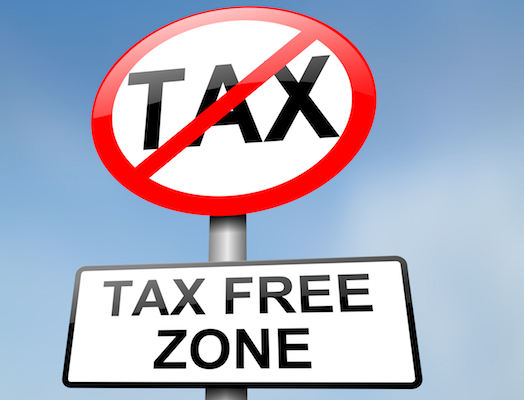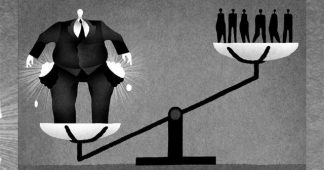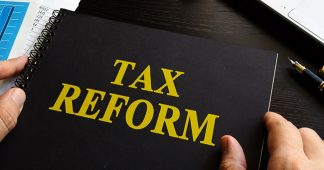While Jeff Bezos, the founder and CEO of Amazon, was caught red-handed flashing around some salacious stuff last year, tax dollars from his multi-billionaire dollar Amazon empire weren’t among the booty.
Despite posting profits of over $11 billion last year, the online shopping monster didn’t pay a single penny in federal taxes in 2018. The company’s busy bookkeepers found clever ways of actually getting a federal income tax rebate of $129 million, which essentially means Uncle Sam dropped a maraschino cherry on top of Amazon’s massive cash slushie.
Meanwhile, Bezos, who once earned more on a lunch break than some countries earn in months, has been crowned the wealthiest person on the planet. Last year, his net worth smashed $150 billion – some $50 billion more than Microsoft’s CEO runner-up Bill Gates.
So, as average Americans prepare for the annual ritual of mailing their tax returns by the April 15 deadline, many do so in the knowledge that they will owe Uncle Sam some money. Behemoth companies like Amazon, however, rarely have such worries. They have the means to avoid paying what many believe are their rightful dues. This was not the way things were supposed to be.
In 2017, Donald Trump, in one of his first acts as president, signed the so-called Tax Cuts and Jobs Act, which reduced the corporate tax rate from 35 percent to 21 percent. Proponents of the legislation, underestimating the pervasive allure of greed, believed this reduction would make corporations more willing to pay their fair share of the tax load. Obviously, the plan backfired.
The new tax law “failed to broaden the tax base or close a slew of tax loopholes that allow profitable companies to routinely avoid paying federal and state income taxes on almost half of their profits,”according to the Institute on Taxation and Economic Policy (ITEP).
In a major study on corporate taxes, the ITEP discovered that between the period 2008 to 2015, eighteen of the 258 Fortune 500 companies paid no federal income tax.
Meanwhile, as if to prove the maxim “give them an inch and they’ll take a mile,” the largest US corporations still turn to the government for subsidies. In other words, ‘socialism for the rich, capitalism for the poor.’
Public opinion, however, is increasingly opposed to free handouts to the insanely rich capitalist enterprises that are single-mindedly geared towards profits at the expense of everyone else.
Anything is possible: today was the day a group of dedicated, everyday New Yorkers & their neighbors defeated Amazon’s corporate greed, its worker exploitation, and the power of the richest man in the world. https://t.co/nyvm5vtH9k
— Alexandria Ocasio-Cortez (@AOC) 14 Φεβρουαρίου 2019
In a possible sign of things to come, just last week Amazon was forced to cancel its ambitious plans for a new headquarters in New York City following public opposition to the $3 billion in subsidies – originally intended for poor neighborhoods – the online giant was demanding from city and state coffers.
“Jobs are good but we need to get them the right way and we shouldn’t be subsidizing to the tune of $3 billion plus,”Senator Michael Gianaris told Bloomberg. “This is the type of extortion by Amazon that’s got us into this mess in the first place.”
Not everyone, however, was against Amazon putting its dirty hands in the cookie jar. New York Governor Andrew Cuomo argued in favor of the deal, saying the new facility would have created some 25,000 tech jobs, with $27 billion in revenue from taxes filling state coffers.
The $3 billion in subsidies would have been a small price to pay for such a return, he said. However, while Amazon may have lost a battle in New York, it has the power to win any war. In fact, it may qualify for federal tax breaks intended to assist economically-challenged neighborhoods by constructing a new Virginia data center in America’s wealthiest county.
This local battle provides a microcosm of the national debate on whether “to tax or not to tax” the largest corporations. On the one hand, some argue that keeping taxes on the largest corporations to the barest minimum allows these entities to plough their cash into research and development, equipment and other investments that allow them to grow new products and by extension jobs.
Still, that argument seems to fall short of reality. Forcing struggling middle-class Americans to pay their taxes while giving the largest companies a free tax ride is simply wrong on so many levels.
Matthew Gardner, ITEP senior fellow, rejected the notion that companies are somehow immune from paying taxes. Calling out Amazon by name, he said, “More than any company I have ever seen they have built their company around tax avoidance.”
Whatever the case may be, one thing is becoming clear: news that some of the most powerful companies in the world are not only avoiding federal taxes, but also getting government subsidies is beginning to make for some very bad optics.
Indeed, at a time when many Americans are having trouble making ends meet and once vibrant US neighborhoods are witnessing the growth of tent cities along their tree-lined streets, the question of corporate responsibility is rapidly moving to the forefront of debate.
You know what Amazon paid in federal income taxes last year?
Zero. https://t.co/2bVwXQNATl
— Bernie Sanders (@SenSanders) 30 Απριλίου 2018
In January, social media went into meltdown following comments by Alexandria Ocasio-Cortez, the rising freshman Democratic lawmaker, after she told Anderson Cooper on a segment of 60 Minutes that she wants to increase the marginal tax rate to 70 percent on earnings that exceed $10 million dollars. Criticism of that idea ran the gauntlet from Ocasio-Cortez being a Marxist ideologue to a wannabe slave owner.
Slavery is when your owner takes 100% of your production.
Democrat congresswoman Ocasio-Cortez wants 70% (according to CNN)
What is the word for 70% expropriation?— Grover Norquist (@GroverNorquist) 5 Ιανουαρίου 2019
Nevertheless, despite the outpouring of criticism, mostly from the other side of the political aisle, a surprising number of Americans rallied behind the ‘radical’ idea. Even Microsoft titan Bill Gates, while calling Ocasio-Cortez’s plan “too extreme,” admitted in an interview with CNN that “the government should require people in my position to pay significantly higher taxes.” Meanwhile, Warren Buffett, the famous ‘Oracle of Omaha’ went on record years ago advocating for the rich to pay a higher tax rate. Nobody seemed to take the idea serious.
Yet it should be remembered that the marginal tax rates during the Eisenhower and Nixon presidencies were 91 and 70 percent, respectively, and the country didn’t come screeching to a halt.
And we mustn’t forget Bernie Sanders, the self-described ‘democratic socialist’ who just threw his battered hat into the 2020 presidential running. Not to be outdone by the photogenic Ocasio-Cortez, Sanders saw her 70 percent tax hike and raised it to 77 percent for all profits exceeding $1 billion.
But perhaps the biggest indication that change is in the air came during Trump’s State of the Union Address when he made an unprecedented remark in the course of his speech: “America will never be a socialist country,” the billionaire real estate developer roared.
Perhaps even stranger that such a statement would need to be declared in the very heart of Capitalist Country was the mixed reaction it produced. Although much of the rotunda erupted in applause by Trump’s subtle warning, a sizable number of lawmakers on the Left, including the democratic socialist Bernie Sanders, remained seated and stony faced.
It was a surreal sight that carried a timeless warning to wealthy individuals and corporations that they either pay their dues to society or face the possibility that there will be some reckoning of accounts sometime down the road. With that prospect in mind, it will be interesting to see how the question of corporate responsibility and ethics shapes the 2020 presidential elections.
Whatever the case may be, Amazon should enjoy the free ride while it lasts because it may be coming to an end soon.
Robert_Bridge











